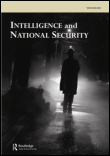
INTELLIGENCE AND NATIONAL SECURITY
Scope & Guideline
Decoding the Interplay of Intelligence and Power
Introduction
Aims and Scopes
- Interdisciplinary Research on Intelligence:
The journal emphasizes research that integrates various disciplines, including political science, sociology, history, and law, to analyze intelligence practices and their implications for national security. - Empirical Studies of Intelligence Practices:
It publishes empirical studies that examine real-world intelligence operations, their effectiveness, failures, and the evolving nature of intelligence in contemporary security environments. - Theoretical Frameworks in Intelligence Studies:
The journal encourages contributions that develop and critique theoretical frameworks for understanding intelligence processes, including models of decision-making, analysis, and operational effectiveness. - Historical Perspectives on Intelligence:
A significant focus is placed on historical analyses of intelligence operations, revealing insights into past practices, lessons learned, and their relevance to current national security challenges. - Policy Implications of Intelligence Analysis:
The journal aims to bridge the gap between academic research and practical implications, addressing how intelligence analysis informs policy decisions and national security strategies. - Emerging Technologies and Intelligence:
It explores the impact of technological advancements, such as artificial intelligence and cyber capabilities, on intelligence operations and national security paradigms.
Trending and Emerging
- Cyber Intelligence and Security:
A significant increase in discussions around cyber intelligence highlights the growing recognition of cybersecurity as a critical component of national security, especially in light of recent geopolitical tensions. - Intelligence and Hybrid Warfare:
The journal has seen a rise in articles addressing the intersection of intelligence and hybrid warfare, reflecting the complexities of modern conflicts that blend conventional and unconventional tactics. - Intelligence in Crisis Situations:
Emerging literature on intelligence practices during crises, such as the COVID-19 pandemic or ongoing conflicts, underscores the importance of adaptive intelligence frameworks in dynamic environments. - Public Perception and Intelligence Accountability:
There is a growing focus on the relationship between public perception of intelligence agencies and their accountability, indicating a trend toward exploring the societal impacts of intelligence practices. - Impact of Artificial Intelligence on Intelligence Operations:
The integration of artificial intelligence into intelligence analysis and operations is increasingly discussed, highlighting the transformative potential of technology in shaping future intelligence methodologies.
Declining or Waning
- Traditional Espionage Techniques:
There seems to be a decline in articles focusing on traditional espionage methods, as the field increasingly prioritizes discussions on cyber intelligence and data analytics over conventional spycraft. - Cold War Dynamics:
As contemporary geopolitical issues evolve, the journal has seen a reduction in the frequency of papers specifically centered on Cold War intelligence dynamics, indicating a shift towards more current and relevant security challenges. - Historical Case Studies of Intelligence Failures:
While historical analyses remain important, there is a noticeable decrease in the number of articles solely dedicated to historical case studies of intelligence failures, replaced by a broader focus on contemporary issues. - Focus on Domestic Intelligence:
The journal appears to be moving away from themes centered around domestic intelligence operations, possibly due to a growing interest in international intelligence dynamics and transnational threats. - Gender and Intelligence Studies:
Although gender perspectives have been introduced, there is a diminishing focus on gender-specific analyses within intelligence studies, suggesting a need for more robust engagement with this theme.
Similar Journals
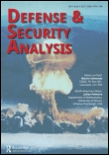
Defence and Security Analysis
Bridging Theory and Practice in Security Studies.Defence and Security Analysis is an esteemed journal that focuses on the critical intersections of security studies, international relations, and geopolitical dynamics. Published by Routledge Journals, Taylor & Francis Ltd in the United Kingdom, this journal serves as a vital platform for scholars, practitioners, and students to disseminate innovative research and insights concerning contemporary defence and security issues. With an ISSN of 1475-1798 and an E-ISSN of 1475-1801, it has achieved a commendable standing, ranking in the Q2 category for Political Science and International Relations and Q3 for Geography, Planning and Development as of 2023. The journal covers a range of pertinent topics with a dedicated convergence of years from 2003 to 2024, making it an invaluable resource for anyone looking to engage deeply with this evolving field. Although it is not open access, its rich content is crucial for informing policy and academic discourse on global security challenges.

POLITY
Exploring the Dynamics of Political IdeologiesPOLITY, published by University of Chicago Press, is a premier academic journal that navigates the intricate landscapes of sociology and political science. With an ISSN of 0032-3497 and an E-ISSN of 1744-1684, this esteemed periodical has been a vital platform for scholarly discourse and innovative research since its convergence in 1995, continuing to inform and shape the field until 2024. Ranking in the 2nd quartile (Q2) and positioned at #637 out of 1466 in the Scopus rankings for Social Sciences in sociology and political science, POLITY stands out for its commitment to quality and its impact on contemporary debates. Researchers and students alike will find an array of articles that delve into the complexities of social structures and political ideologies, offering critical insights essential for advancing both theoretical understanding and practical applications. While access options may vary, the journal remains a pivotal resource in fostering dialogue among scholars interested in the dynamic interplay between politics and society.
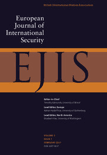
European Journal of International Security
Innovating insights into contemporary security issues.The European Journal of International Security, published by Cambridge University Press, stands as a premier platform for scholarly discourse within the realms of political science, international relations, sociology, and safety research. With its esteemed Q1 ranking in multiple categories for 2023, this journal is recognized for its high-impact research contributions, positioned within the top percentile of its field. Covering a broad spectrum of topics, from security policy analysis to sociopolitical dynamics, the journal aims to foster a deeper understanding of contemporary security challenges while advancing academic inquiry. Notably, with its ISSN 2057-5637 and E-ISSN 2057-5645, the journal provides essential insights for researchers, practitioners, and students alike, affirming its commitment to excellence in the academic landscape of the United Kingdom and beyond. With a converged focus spanning from 2016 to 2024, the journal encourages contributions that critically address the evolving nature of international security in a complex world.

Naval War College Review
Shaping the Dialogue on International Naval RelationsNaval War College Review is a prestigious academic journal published by the US Naval War College, dedicated to advancing scholarship in naval and maritime strategy, military operations, and international relations. This journal serves as a vital platform for the dissemination of cutting-edge research, insightful analysis, and theoretical discourse that addresses contemporary and historical issues affecting global security and naval warfare. With an ISSN of 0028-1484, the review offers an important repository of knowledge for researchers, professionals, and students alike, encompassing interdisciplinary studies related to naval strategy, policy formulation, and military history. The Naval War College Review is committed to fostering a deeper understanding of the maritime domain, empowering its readers to navigate the complexities of naval warfare through rigorous scholarship. Although it is not an open-access journal, its critical contributions continue to shape the future of naval studies and defense considerations across the globe.
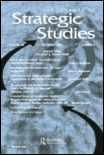
JOURNAL OF STRATEGIC STUDIES
Advancing the Frontiers of Strategic ThoughtJOURNAL OF STRATEGIC STUDIES is a premier academic journal dedicated to the fields of political science and international relations, published by Routledge Journals, Taylor & Francis Ltd. Established in 1978, this journal has built a strong reputation for disseminating high-quality research and theoretical contributions that drive innovation and scholarship in strategic studies. With a commendable impact factor that places it in the Q1 quartile for Political Science and International Relations, and Q2 quartile for Sociology and Political Science, the journal ranks among the top publications with notable Scopus rankings that reflect its influence and reach. The journal’s comprehensive scope encompasses a wide array of topics, from security studies to diplomacy, making it an invaluable resource for researchers, professionals, and students alike. Although it operates on a subscription-based access model, the journal's commitment to advancing knowledge in strategic studies ensures that it remains a vital platform for scholarly dialogue and exploration. Join the community of scholars contributing to cutting-edge research through this leading journal.
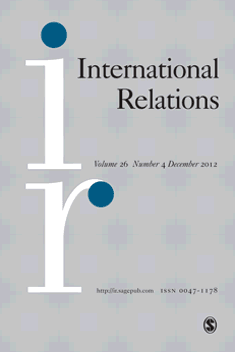
International Relations
Catalyzing insights that influence policy and theory.International Relations is a premier journal dedicated to advancing the field of political science and international relations, published by SAGE Publications Ltd in the United Kingdom. With its ISSN 0047-1178 and E-ISSN 1741-2862, this journal has served as a critical platform for scholarly discourse since its inception, covering a wide range of themes from global governance to security studies. Having achieved a Q1 ranking in the 2023 category quartiles for Political Science and International Relations, it stands out among a selective group of influential academic publications, ranking #145 out of 706 in its field, placing it in the 79th percentile according to Scopus metrics. The journal operates under a traditional subscription model, catering to a diverse audience of researchers, academics, and professionals who seek to contribute to and engage with emerging ideas and debates. The objective of International Relations is to foster innovative research that addresses the intricate dynamics shaping international interactions, thus providing vital insights that inform policy-making and theoretical developments alike. As such, it remains an essential resource for anyone committed to understanding and influencing the future of global affairs.

ARMED FORCES & SOCIETY
Advancing Understanding of Armed Forces DynamicsARMED FORCES & SOCIETY is a distinguished academic journal published by SAGE Publications Inc., focusing on the critical intersection of military and societal dynamics. With an ISSN of 0095-327X and an E-ISSN of 1556-0848, this journal has been a cornerstone of research since its inception in 1974, with continued publication through 2024. Recognized for its rigorous scholarship, it holds esteemed Q2 quartile rankings in key academic categories including Safety Research, Social Sciences (miscellaneous), and Sociology and Political Science. The journal is highly regarded within the Scopus rankings, placing in the 76th percentile for Social Sciences (miscellaneous) and in the 73rd percentile for Sociology and Political Science. ARMED FORCES & SOCIETY serves as an invaluable platform for researchers, professionals, and students eager to explore empirical studies, theoretical discussions, and policy analyses that shape military effectiveness and social impact.

Critical Studies on Security
Fostering Scholarly Dialogue on Security DynamicsCritical Studies on Security, published by TAYLOR & FRANCIS LTD, stands as a pivotal journal in the realm of Political Science and International Relations. With an ISSN of 2162-4887 and E-ISSN of 2162-4909, this peer-reviewed journal has carved out its niche since its inception in 2013, continuing to provide a platform for innovative research up until 2024. Its prestigious positioning in the Q1 category of both Political Science and International Relations—ranked #135 out of 706 by Scopus—underscores its significant impact within the academic community, holding a percentile ranking of 80th. Although the journal is not open access, it remains essential for scholars, offering insights that critically assess security studies through diverse theoretical and methodological lenses. As a researcher, professional, or student in the field, engaging with its cutting-edge articles will be invaluable for understanding contemporary security challenges and debates.
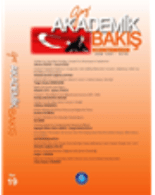
Gazi Akademik Bakis-Gazi Academic View
Empowering Scholars, Enriching Perspectives.Gazi Akademik Bakis - Gazi Academic View is a distinguished peer-reviewed journal published by HALE SIVGIN, dedicated to fostering academic discourse and knowledge across various disciplines. Since its inception in 2007, the journal has embraced an Open Access model, ensuring that its valuable insights are freely accessible to researchers, professionals, and students worldwide. With an ISSN of 1307-9778 and E-ISSN 1309-5137, Gazi Academic View serves as a vital platform for innovative scholarship, promoting rigorous research and discussions that impact both local and international academic communities. Situated in Ankara, Turkiye, the journal's editorial strategy emphasizes inclusivity and the advancement of knowledge, making it an essential resource for anyone seeking to engage with contemporary issues in their respective fields. The journal aims to maintain a high standard of scholarly publication, often featuring studies that contribute to the evolution of theoretical and practical frameworks across multiple sectors.

Czech Journal of International Relations
Elevating Czech Insights in Global ScholarshipCzech Journal of International Relations is a premier Open Access journal published by Institute of International Relations, Prague, dedicated to advancing the study of international relations from a Czech perspective while fostering global scholarly discourse. With the ISSN 2788-2985 and E-ISSN 2788-2993, the journal embraces a rich array of topics within the fields of political science and international relations, contributing significantly to the academic community. Since transitioning to open access in 2017, it has enhanced accessibility for researchers, professionals, and students worldwide, promoting a diverse exchange of ideas. With an emerging reputation in the scholarly community reflected in its Scopus rank of #319 out of 706 in the Social Sciences category, the journal is poised for significant growth and influence in the years to come. The editorial team ensures a rigorous review process, maintaining high academic standards while encouraging innovative research trajectories from 2023 to 2024. Scholars are invited to explore and contribute to a journal that not only highlights critical issues within international relations but also serves as a vital resource for future-oriented research.